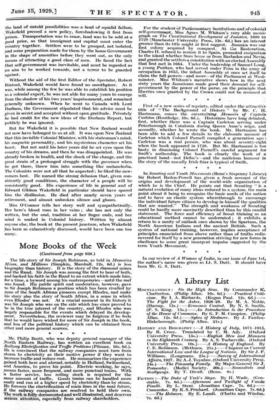For the student of Parliamentary institutions and of colonial self-governing*,
Miss Agnes M. 'Vhition's very able monisk- graph on The Chnstitutional Development of Jamaica, 1660 to 1729 (Manchester University Press, 12s. 6d.) has- an interestt greater than its title might at first suggest. Jamaica was our first colony acquired by conquest. At tle Restoration, Charles II. refused to restore it to Spain, promoted emigration to the island whether from home or from Barbados and Nevis, and granted the settlers a constitution with an elected Assembly that first met in 1664. Under the leadership of Samuel Long, a young Puritan, who had served under Penn in the army of occupation in 1655, the infant Assembly at once set itself to claim the full powers-and more-of the Parliament at West- minster. Miss Whitson's narrative shows how in the next sixty years the Jamaicans made good their demand for self- government by the power of the purse, on the principle that liberties once granted by the Crown could not be resumed at will. • * * * s






































 Previous page
Previous page